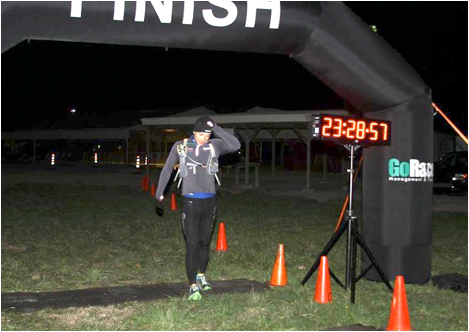On April 6th just before 5:30 am, first year PhD student Caleb Lareau completed Prairie Spirit 100 mile Ultramarathon in 23 hours and 29 minutes, setting a new personal-best and placing him 13th out of 75 entrants for this race. He took some time to answer questions for this week’s student interview about his passion/hobby.
What’s the hardest part of running 100 miles?
Typically, 50% of starters DNF (do not finish) an ultra of this distance, so it’s difficult to isolate a single element that makes them markedly more difficult. While straining one’s body to this degree can be overwhelming even for an experience athlete, I’ve found that maintaining a settled stomach over the course of 24+ hours of running to be the most challenging aspect. In this most recent race, I couldn’t keep down any nutrients after mile 85, and by mile 93, I had virtually no energy stores left to continue running, so I hobbled into the finish.
Are you running the whole time or do you stop to sleep?
For the month leading up to the race, I didn’t drink any caffeine, which made my body very sensitive to the substance. After about 14 hours of running, I had about 6 ounces of soda and felt a substantial difference in my alertness and ability to continue within a matter of 20 minutes. By modulating my caffeine intake, I was able to run throughout the night.
During the event, I made two stops of 30+ minutes at miles 50 and 80 to treat my blisters when the pain became debilitating. Otherwise, aside from walking when eating or working out a cramp, I tried to maintain a pace of 5-6 miles an hour.
What got you interested in pursuing events of this nature?
One of the philosophies that especially resonates with my worldview is the idea that through combatting and overcoming adversity, we as humans can emerge from situations as better versions of ourselves. Acknowledging that I’ve had a fairly comfortable life, I’ve found intensive endurance athletics as a phenomenal means to develop my self-discipline, drive, focus, and tenacity.
In his memoir The PhD Grind, Philip Guo made a compelling link that I found to be particularly accurate at this point in my life:
“Why would anyone spend years training to excel in a sport… when they aren’t going to become professional athletes? In short, this experience pushes people far beyond their physical limits and enables them to emerge stronger as a result. In some ways, doing a Ph.D. is the intellectual equivalent of intense athletic training.”
What’s the next event that you’ll be training for?
I’m looking forward to a really competitive beer mile with Matt Ploenzke and Kevin Cummiskey.




